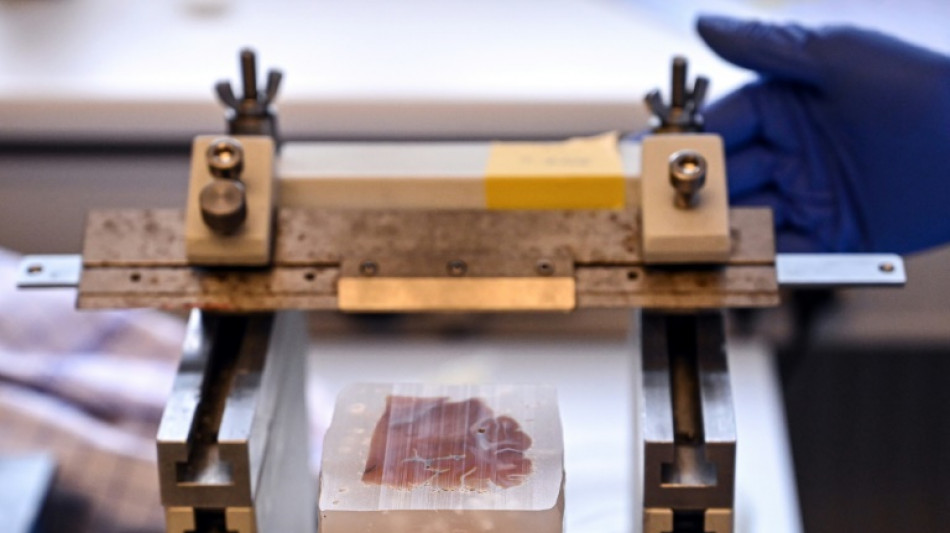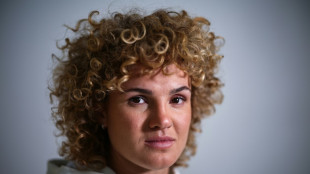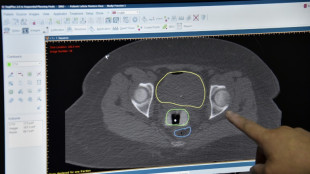
-
 Brazil's Bolsonaro leaves house arrest for medical exams
Brazil's Bolsonaro leaves house arrest for medical exams
-
Mikautadze gets Lyon off to winning start in Ligue 1 at Lens

-
 Fires keep burning in western Spain as army is deployed
Fires keep burning in western Spain as army is deployed
-
Captain Wilson scores twice as Australia stun South Africa

-
 Thompson eclipses Lyles and Hodgkinson makes stellar comeback
Thompson eclipses Lyles and Hodgkinson makes stellar comeback
-
Spurs get Frank off to flier, Sunderland win on Premier League return

-
 Europeans try to stay on the board after Ukraine summit
Europeans try to stay on the board after Ukraine summit
-
Richarlison stars as Spurs boss Frank seals first win

-
 Hurricane Erin intensifies to 'catastrophic' category 5 storm in Caribbean
Hurricane Erin intensifies to 'catastrophic' category 5 storm in Caribbean
-
Thompson beats Lyles in first 100m head-to-head since Paris Olympics

-
 Brazil's Bolsonaro leaves house arrest for court-approved medical exams
Brazil's Bolsonaro leaves house arrest for court-approved medical exams
-
Hodgkinson in sparkling track return one year after Olympic 800m gold

-
 Air Canada grounds hundreds of flights over cabin crew strike
Air Canada grounds hundreds of flights over cabin crew strike
-
Hurricane Erin intensifies to category 4 storm as it nears Caribbean

-
 Championship leader Marc Marquez wins sprint at Austrian MotoGP
Championship leader Marc Marquez wins sprint at Austrian MotoGP
-
Newcastle held by 10-man Villa after Konsa sees red

-
 Semenyo says alleged racist abuse at Liverpool 'will stay with me forever'
Semenyo says alleged racist abuse at Liverpool 'will stay with me forever'
-
In high-stakes summit, Trump, not Putin, budges

-
 Pakistan rescuers recover bodies after monsoon rains kill 340
Pakistan rescuers recover bodies after monsoon rains kill 340
-
Hurricane Erin intensifies to category 3 storm as it nears Caribbean

-
 Ukrainians see 'nothing' good from Trump-Putin meeting
Ukrainians see 'nothing' good from Trump-Putin meeting
-
Pakistan rescuers recover bodies after monsoon rains kill 320

-
 Bob Simpson: Australian cricket captain and influential coach
Bob Simpson: Australian cricket captain and influential coach
-
Air Canada flight attendants strike over pay, shutting down service

-
 Air Canada set to shut down over flight attendants strike
Air Canada set to shut down over flight attendants strike
-
Majority of Americans think alcohol bad for health: poll

-
 Hurricane Erin intensifies in Atlantic, eyes Caribbean
Hurricane Erin intensifies in Atlantic, eyes Caribbean
-
Louisiana sues Roblox game platform over child safety

-
 Kildunne confident Women's Rugby World Cup 'heartbreak' can inspire England to glory
Kildunne confident Women's Rugby World Cup 'heartbreak' can inspire England to glory
-
Arsenal 'digging for gold' as title bid starts at new-look Man Utd

-
 El Salvador to jail gang suspects without trial until 2027
El Salvador to jail gang suspects without trial until 2027
-
Alcaraz survives to reach Cincy semis as Rybakina topples No. 1 Sabalenka

-
 Trump hails Putin summit but no specifics on Ukraine
Trump hails Putin summit but no specifics on Ukraine
-
El Salvador extends detention of suspected gang members

-
 Scotland's MacIntyre fires 64 to stay atop BMW Championship
Scotland's MacIntyre fires 64 to stay atop BMW Championship
-
Colombia's Munoz fires 59 to grab LIV Golf Indy lead

-
 Alcaraz survives Rublev to reach Cincy semis as Rybakina topples No. 1 Sabalenka
Alcaraz survives Rublev to reach Cincy semis as Rybakina topples No. 1 Sabalenka
-
Trump offers warm welcome to Putin at high-stakes summit

-
 Semenyo racist abuse at Liverpool shocks Bournemouth captain Smith
Semenyo racist abuse at Liverpool shocks Bournemouth captain Smith
-
After repeated explosions, new test for Musk's megarocket

-
 Liverpool strike late to beat Bournemouth as Jota remembered in Premier League opener
Liverpool strike late to beat Bournemouth as Jota remembered in Premier League opener
-
Messi expected to return for Miami against Galaxy

-
 Made-for-TV pageantry as Trump brings Putin in from cold
Made-for-TV pageantry as Trump brings Putin in from cold
-
Coman bids farewell to Bayern before move to Saudi side Al Nassr

-
 Vietnamese rice grower helps tackle Cuba's food shortage
Vietnamese rice grower helps tackle Cuba's food shortage
-
Trump, Putin shake hands at start of Alaska summit

-
 Coman bids farewell to Bayern ahead of Saudi transfer
Coman bids farewell to Bayern ahead of Saudi transfer
-
Liverpool honour Jota in emotional Premier League curtain-raiser

-
 Portugal wildfires claim first victim, as Spain on wildfire alert
Portugal wildfires claim first victim, as Spain on wildfire alert
-
Davos founder Schwab cleared of misconduct by WEF probe


Grey area: chilling past of world's biggest brain collection
Countless shelves line the walls of a basement at Denmark's University of Odense, holding what is thought to be the world's largest collection of brains.
There are 9,479 of the organs, all removed from the corpses of mental health patients over the course of four decades until the 1980s.
Preserved in formalin in large white buckets labelled with numbers, the collection was the life's work of prominent Danish psychiatrist Erik Stromgren.
Begun in 1945, it was a "kind of experimental research," Jesper Vaczy Kragh, an expert in the history of psychiatry, explained to AFP.
Stromgren and his colleagues believed "maybe they could find out something about where mental illnesses were localised, or they thought they might find the answers in those brains".
The brains were collected after autopsies had been conducted on the bodies of people committed to psychiatric institutes across Denmark.
Neither the deceased nor their families were ever asked permission.
"These were state mental hospitals and there were no people from the outside who were asking questions about what went on in these state institutions," he said.
At the time, patients' rights were not a primary concern.
On the contrary, society believed it needed to be protected from these people, the researcher from the University of Copenhagen said.
Between 1929 and 1967, the law required people committed to mental institutions to be sterilised.
Up until 1989, they had to get a special exemption in order to be allowed to marry.
Denmark considered "mentally ill" people, as they were called at the time, "a burden to society (and believed that) if we let them have children, if we let them loose... they will cause all kinds of trouble," Vaczy Kragh said.
Back then, every Dane who died was autopsied, said pathologist Martin Wirenfeldt Nielsen, the director of the collection.
"It was just part of the culture back then, an autopsy was just another hospital procedure," Nielsen said.
The evolution of post-mortem procedures and growing awareness of patients' rights heralded the end of new additions to the collection in 1982.
A long and heated debate then ensued on what to do with it.
Denmark's state ethics council ultimately ruled it should be preserved and used for scientific research.
- Unlocking hidden secrets -
The collection, long housed in Aarhus in western Denmark, was moved to Odense in 2018.
Research on the collection has over the years covered a wide range of illnesses, including dementia, schizophrenia, bipolar disorder and depression.
"The debate has basically settled down, and (now people) say 'okay, this is very impressive and useful scientific research if you want to know more about mental disease'," the collection's director said.
Some of the brains belonged to people who suffered from both mental health issues and brain illnesses.
"Because many of these patients were admitted for maybe half their life, or even their entire life, they would also have had other brain diseases, such as a stroke, epilepsy or brain tumours," he added.
Four research projects are currently using the collection.
"If it's not used, it does no good," says the former head of the country's mental health association, Knud Kristensen.
"Now we have it, we should actually use it," he said, complaining about a lack of resources to fund research.
Neurobiologist Susana Aznar, a Parkinson's expert working at a Copenhagen research hospital, is using the collection as part of her team's research project.
She said the brains were unique in that they enable scientists to see the effects of modern treatments.
"They were not treated with the treatments that we have now," she said.
The brains of patients nowadays may have been altered by the treatments they have received.
When Aznar's team compares these with the brains from the collection, "we can see whether these changes could be associated with the treatments," she said.
C.Kovalenko--BTB



